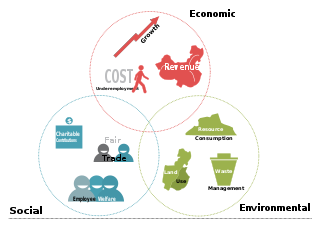Related Research Articles
Behavior or behaviour is the range of actions and mannerisms made by individuals, organisms, systems or artificial entities in some environment. These systems can include other systems or organisms as well as the inanimate physical environment. It is the computed response of the system or organism to various stimuli or inputs, whether internal or external, conscious or subconscious, overt or covert, and voluntary or involuntary.

In economics, inflation is an increase in the general price level of goods and services in an economy. When the general price level rises, each unit of currency buys fewer goods and services; consequently, inflation corresponds to a reduction in the purchasing power of money. The opposite of inflation is deflation, a decrease in the general price level of goods and services. The common measure of inflation is the inflation rate, the annualized percentage change in a general price index. As prices faced by households do not all increase at the same rate, the consumer price index (CPI) is often used for this purpose. The employment cost index is also used for wages in the United States.

Marketing is the process of exploring, creating, and delivering value to meet the needs of a target market in terms of goods and services; potentially including selection of a target audience; selection of certain attributes or themes to emphasize in advertising; operation of advertising campaigns; attendance at trade shows and public events; design of products and packaging attractive to buyers; defining the terms of sale, such as price, discounts, warranty, and return policy; product placement in media or with people believed to influence the buying habits of others; agreements with retailers, wholesale distributors, or resellers; and attempts to create awareness of, loyalty to, and positive feelings about a brand. Marketing is typically done by the seller, typically a retailer or manufacturer. Sometimes tasks are contracted to a dedicated marketing firm or advertising agency. More rarely, a trade association or government agency advertises on behalf of an entire industry or locality, often a specific type of food, food from a specific area, or a city or region as a tourism destination.

In economics, an externality or external cost is an indirect cost or benefit to an uninvolved third party that arises as an effect of another party's activity. Externalities can be considered as unpriced goods involved in either consumer or producer market transactions. Air pollution from motor vehicles is one example. The cost of air pollution to society is not paid by either the producers or users of motorized transport to the rest of society. Water pollution from mills and factories is another example. All consumers are made worse off by pollution but are not compensated by the market for this damage. A positive externality is when an individual's consumption in a market increases the well-being of others, but the individual does not charge the third party for the benefit. The third party is essentially getting a free product. An example of this might be the apartment above a bakery receiving the benefit of enjoyment from smelling fresh pastries every morning. The people who live in the apartment do not compensate the bakery for this benefit.
A subsidy or government incentive is a type of government expenditure targeted towards individuals and households, as well as businesses with the aim of stabilising the economy. It ensures that individuals and households are viable by having access to essential goods and services while giving businesses the opportunity to stay afloat and/or competitive. Subsidies not only promote long term economic stability but also help governments to respond to economic shocks during a recession or in response to unforeseen shocks such as COVID-19.

An interest rate is the amount of interest due per period, as a proportion of the amount lent, deposited, or borrowed. The total interest on an amount lent or borrowed depends on the principal sum, the interest rate, the compounding frequency, and the length of time over which it is lent, deposited, or borrowed.

Consumerism is a social and economic order that encourages the acquisition of goods and services in ever-increasing amounts. With the Industrial Revolution, but particularly in the 20th century, mass production led to overproduction—the supply of goods would grow beyond consumer demand, and so manufacturers turned to planned obsolescence and advertising to manipulate consumer spending. In 1899, a book on consumerism published by Thorstein Veblen, called The Theory of the Leisure Class, examined the widespread values and economic institutions emerging along with the widespread "leisure time" at the beginning of the 20th century. In it, Veblen "views the activities and spending habits of this leisure class in terms of conspicuous and vicarious consumption and waste. Both relate to the display of status and not to functionality or usefulness."
Corporate governance is defined, described or delineated in diverse ways, depending on the writer's purpose. Writers focused on a disciplinary interest or context often adopt narrow definitions that appear purpose-specific. Writers concerned with regulatory policy in relation to corporate governance practices often use broader structural descriptions. A broad (meta) definition that encompasses many adopted definitions is "Corporate governance describes the processes, structures, and mechanisms that influence the control and direction of corporations."
Brand equity, in marketing, is the worth of a brand in and of itself – i.e., the social value of a well-known brand name. The owner of a well-known brand name can generate more revenue simply from brand recognition, as consumers perceive the products of well-known brands as better than those of lesser-known brands.
In marketing, publicity is the public visibility or awareness for any product, service, person or organization. It may also refer to the movement of information from its source to the general public, often via the media. The subjects of publicity include people of public recognition, goods and services, organizations, and works of art or entertainment.

Monetary policy is the policy adopted by the monetary authority of a nation to control either the interest rate payable for very short-term borrowing or the money supply, often as an attempt to reduce inflation or the interest rate, to ensure price stability and general trust of the value and stability of the nation's currency.

The triple bottom line is an accounting framework with three parts: social, environmental and economic. Some organizations have adopted the TBL framework to evaluate their performance in a broader perspective to create greater business value. Business writer John Elkington claims to have coined the phrase in 1994.

Corporate Social Responsibility (CSR) or Social Impact is a form of international private business self-regulation which aims to contribute to societal goals of a philanthropic, activist, or charitable nature by engaging in, with, or supporting professional service volunteering through pro bono programs, community development, administering monetary grants to non-profit organizations for the public benefit, or to conduct ethically oriented business and investment practices. While once it was possible to describe CSR as an internal organizational policy or a corporate ethic strategy similar to what is now known today as Environmental, Social, Governance (ESG); that time has passed as various companies have pledged to go beyond that or have been mandated or incentivized by governments to have a better impact on the surrounding community. In addition national and international standards, laws, and business models have been developed to facilitate and incentivize this phenomenon. Various organizations have used their authority to push it beyond individual or even industry-wide initiatives. In contrast, it has been considered a form of corporate self-regulation for some time, over the last decade or so it has moved considerably from voluntary decisions at the level of individual organizations to mandatory schemes at regional, national, and international levels. Moreover, scholars and firms are using the term "creating shared value", an extension of corporate social responsibility, to explain ways of doing business in a socially responsible way while making profits.
Managerial economics is a branch of economics involving the application of economic methods in the organizational decision-making process. Economics is the study of the production, distribution, and consumption of goods and services. Managerial economics involves the use of economic theories and principles to make decisions regarding the allocation of scarce resources. It guides managers in making decisions relating to the company's customers, competitors, suppliers, and internal operations.
Reputation management, originally a public relations term, refers to the influencing, controlling, enhancing, or concealing of an individual's or group's reputation. The growth of the internet and social media led to growth of reputation management companies, with search results as a core part of a client's reputation. Online reputation management, sometimes abbreviated as ORM, focuses on the management of product and service search engine results. Ethical grey areas include mug shot removal sites, astroturfing customer review sites, censoring complaints, and using search engine optimization tactics to influence results. In other cases, the ethical lines are clear; some reputation management companies are closely connected to websites that publish unverified and libelous statements about people. Such unethical companies charge thousands of dollars to remove these posts – temporarily – from their websites.
Social return on investment (SROI) is a principles-based method for measuring extra-financial value. It can be used by any entity to evaluate impact on stakeholders, identify ways to improve performance, and enhance the performance of investments.
Anti-consumerism is a sociopolitical ideology that is opposed to consumerism, the continual buying and consuming of material possessions. Anti-consumerism is concerned with the private actions of business corporations in pursuit of financial and economic goals at the expense of the public welfare, especially in matters of environmental protection, social stratification, and ethics in the governing of a society. In politics, anti-consumerism overlaps with environmental activism, anti-globalization, and animal-rights activism; moreover, a conceptual variation of anti-consumerism is post-consumerism, living in a material way that transcends consumerism.
In economics a spillover is an economic event in one context that occurs because of something else in a seemingly unrelated context. For example, externalities of economic activity are non-monetary spillover effects upon non-participants. Odors from a rendering plant are negative spillover effects upon its neighbors; the beauty of a homeowner's flower garden is a positive spillover effect upon neighbors. The concept of spillover in economics could be replaced by terminations of technology spillover, R&D spillover and/or knowledge spillover when the concept is specific to technology mamagement and innovation economics.

A brand is a name, term, design, symbol or any other feature that distinguishes one seller's good or service from those of other sellers. Brands are used in business, marketing, and advertising for recognition and, importantly, to create and store value as brand equity for the object identified, to the benefit of the brand's customers, its owners and shareholders. Brand names are sometimes distinguished from generic or store brands.
Social accounting is the process of communicating the social and environmental effects of organizations' economic actions to particular interest groups within society and to society at large. Social Accounting is different from public interest accounting as well as from critical accounting.
References
- ↑ "Professionalism vs Commercialism: The Association Between Non-Audit Services (NAS) and Audit Independence". Journal of Business Finance & Accounting. 28 (5–6): 563–594. 2001. doi:10.1111/1468-5957.00386.
- ↑ "Commercialism and Universities: An Ethical Analysis". Journal of Academic Ethics. 8: 1–19. 2010. doi:10.1007/s10805-010-9109-9.